BAKU, Azerbaijan, September 9. There has been no progress in resolving the outstanding safeguards issues regarding Iran's nuclear program, said Rafael Grossi, Director General of the International Atomic Energy Agency (IAEA), Trend reports.
"Iran says it has declared all nuclear material, activities, and locations required under its NPT Safeguards Agreement. However, this statement is inconsistent with the agency’s findings of uranium particles of anthropogenic origin at undeclared locations in Iran. The IAEA needs to know the current location(s) of the nuclear material and/or of contaminated equipment involved," Grossi said, as he addressed the Board of Governors.
He further noted that Iran still is not implementing modified Code 3.1, which is a legal obligation for Iran, having stated it had suspended such implementation.
"These outstanding safeguards issues stem from Iran’s obligations under its Comprehensive Safeguards Agreement and need to be resolved for the agency to be able to assure that Iran’s nuclear program is exclusively peaceful," Grossi added.
The Comprehensive Plan of Joint Action on Iran's nuclear program was implemented between Iran and the P5+1 group (the US, Russia, China, the UK, France, and Germany) in January 2016. In May 2018, the US announced its withdrawal from the plan and imposed sanctions on Iran in November of the same year. Iran announced in 2020 that there would be no restrictions on the Iran nuclear deal.
Meanwhile, in late 2020, the Iranian parliament adopted a strategic plan to counter the sanctions, citing the non-fulfillment of the JCPOA signed between Iran and six countries and the imposition of sanctions on Iran.
Based on the decision of the Iranian parliament, as of February 23, Iran stopped the implementation of additional measures and an additional protocol included in the nuclear deal. As a consequence, the monitoring mechanism of the IAEA was reduced by 20-30 percent.







